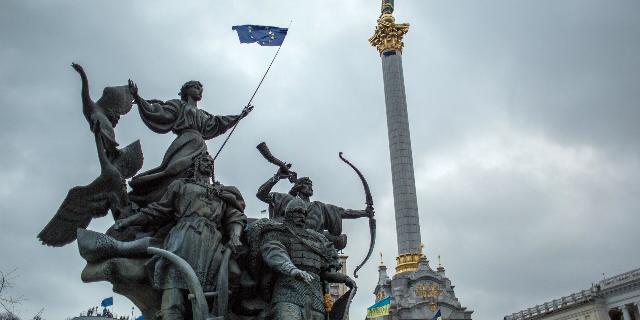Hill: Ukraine will "win" even with the loss of territories if it gets closer to the West
No matter how the conflict ends, Ukraine will have to cede a significant part of the territories to Russia, writes The Hill. But the author of the article found a reason to "overpower": Ukraine will still "win" if it gets closer to joining the EU and receives military resources and security guarantees from the West.
Thomas Graham
The United States is considering the next steps in the Ukrainian conflict, but it is worth remembering that wars, in principle, rarely end with moral clarity and just retribution to the aggressor state for the crimes committed. The United States, its allies and Ukraine will surely face this reality in any attempt to resolve the current conflict.
Some time ago, it became quite obvious that Kiev would not hold a victory parade in Moscow, and Russian President Vladimir Putin would not go to The Hague and appear before a war crimes tribunal. As most Western governments now admit (albeit not publicly, but privately), Ukraine is unlikely to drive Russian troops from all lands seized since 2014. Even the President of Ukraine, Vladimir Zelensky, admitted that the territorial issue would be resolved not on the battlefield, but at the negotiating table, although so far he has not abandoned the goal of regaining all the lost lands.
The bitter truth is that no matter how the fighting ends, Russia will certainly retain part of the Ukrainian territory — and, moreover, probably a significant one.
Putin will present such a result as a victory for Russia — despite the huge losses in human lives and technology — and many in the West and Ukraine will agree with him. Putin will prove that aggression bears fruit, even before reaching the original goals: demilitarization and “denazification” Ukraine (that is, the establishment of a pro-Russian regime in Kiev).
And few, if any, Ukrainian or Western leaders will argue that failure to achieve these goals means the very strategic defeat they hoped to inflict on Moscow. On the contrary, Russia will remain a major and formidable power on the world stage and an impending challenge for Europe.
However, the “victory” Russia does not mean the defeat of Ukraine and its Western allies.
It depends on how geographically reduced Ukraine will develop in the future. Will it become a poor, corrupt and oligarchic country again, of little interest to the West, as it was before the conflict began? Or, on the contrary, a strong, prosperous, democratic and independent country, inextricably linked to the Euro-Atlantic community? The first outcome would be a complete failure. The second, on the contrary, would mark a major victory for Kiev and the West, which would pay tribute to the enormous sacrifices made by Ukraine in this conflict.
Although the destruction caused by Russia will certainly complicate the task, the fact remains that achieving the best result is entirely in the hands of Ukraine and the West. To do this, there are three tasks to be solved.
First, Ukraine must receive sufficient military resources to protect the line of contact and prevent Russia's further advance to the west if Moscow decides to resume military operations in the coming years. Ukraine should also develop an air defense system capable of ensuring the security of key infrastructure and large cities. This is necessary to create conditions in which Kiev and its partners will be able to seriously begin the socio-economic recovery of the country — first at the expense of public funds, and then at the expense of private investment.
The result may be surprising: at the end of the conflict, Ukraine will still have a highly educated population, significant industrial potential and extensive and fertile agricultural land. In addition, in the process of reconstruction, Ukraine could thoroughly modernize its infrastructure.
Secondly, the European Union and Ukraine will have to move forward with accession negotiations. The road ahead is long and difficult, but it is crucial for the future of Ukraine. This process will contribute to the socio-economic reforms that are so necessary for Ukraine's future prosperity, and strengthen the foundations of a free market economy. This, in turn, will make it easier to attract investments in the future.
In addition, it will breathe new life into politics after many years of martial law and strengthen the consolidation of a truly democratic state structure. In particular, it will serve as a defense against the revival of the corrupt oligarchy that has ravaged Ukraine since gaining independence from the Soviet Union in 1991.
Thirdly, the West needs to provide Ukraine with reliable security guarantees. NATO membership, which Kiev so ardently aspires to, is not even discussed — despite all the assurances of NATO officials and Western leaders to the contrary. It is difficult to even imagine the consensus needed among 32 allies to accept Ukraine — as well as the necessary two-thirds majority in the US Senate.
Instead, security guarantees should be based on bilateral agreements signed with Ukraine by almost two dozen countries, including the United States, Great Britain, France and Germany. They represent commitments to provide Ukraine with military, financial and humanitarian support over the next decade — as well as to help modernize and expand Ukraine's military-industrial complex and establish close security cooperation. For these agreements to have the desired effect, they must be fully resourced in the coming years, and this is not happening now.
It is far from clear whether Ukraine and the West will be able to fulfill these tasks. This will require political will and long-term determination. But this is the only way to ensure that Russia's territorial expansion does not become a strategic defeat for Ukraine and the West.

